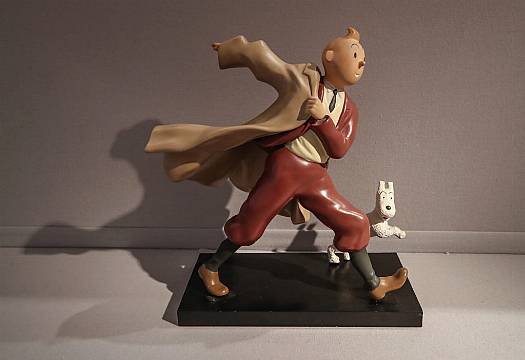Comic book lovers and tourists alike can catch a socially distanced glimpse of a Tintin drawing by Herge in Paris before it goes under the hammer on Thursday.
The artwork is estimated to sell between two and three million euros and possibly break the record for the most expensive comic book art in history.
The 1936 work in Chinese ink, gouache and watercolour, was destined as a cover for The Blue Lotus, the fifth volume of the Belgian journalist’s adventures.
But it never sat on any book store shelves because it was rejected for being too expensive to reproduce on a wide scale, a victim of its own rare craftsmanship.
“They had to do a four colour process printing, so an additional colour and (the publisher) thought that the comic albums were already expensive and reproducing this cover would increase the production costs,” said comics expert Eric Leroy at Art Curial auction house by the Champs-Elysees avenue.
As the name Blue Lotus suggests, the art work places Tintin in Asia.

A huge red dragon appears on a black background by the Belgian reporter’s petrified face.
It is a prized addition to the universe of Tintin, the subject of recent shows in London and Barcelona, a 2011 Hollywood adaptation, a videogame and an app.
In Blue Lotus, Tintin travels to China during the 1931 Japanese invasion to investigate and expose, along with his dog Snowy, Japanese spy networks, drug-smuggling rings and other crimes.
But the huge interest in this work has raised a host of questions among French media regarding the work’s provenance, whether it was a gift to the son of Tintin’s printer or a drawing simply never returned to the artist.
There is no question, however, of its authenticity.
On Thursday, Herge, whose real name was Georges Remi, could break the record for the most expensive piece of comic book art at 2.6 million euros that was previously set by himself.
“We set the previous record for the ‘Pages de Garde’ in 2014 ..it would be fair for this piece to break this record.
“Herge had done only five comic covers using this technique of direct colour so it’s very rare,” Mr Leroy said.







